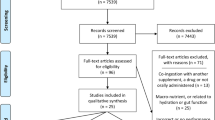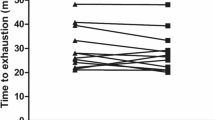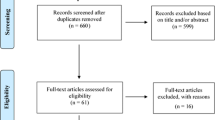Abstract
Background
Heat is associated with physiological strain and endurance performance (EP) impairments. Studies have investigated the impact of caffeine intake upon EP and core temperature (CT) in the heat, but results are conflicting. There is a need to systematically determine the impact of pre-exercise caffeine intake in the heat.
Objective
To use a meta-analytical approach to determine the effect of pre-exercise caffeine intake on EP and CT in the heat.
Design
Systematic review with meta-analysis.
Data Sources
Four databases and cross-referencing.
Data Analysis
Weighted mean effect summaries using robust variance random-effects models for EP and CT, as well as robust variance meta-regressions to explore confounders.
Study Selection
Placebo-controlled, randomized studies in adults (≥ 18 years old) with caffeine intake at least 30 min before endurance exercise ≥ 30 min, performed in ambient conditions ≥ 27 °C.
Results
Respectively six and 12 studies examined caffeine’s impact on EP and CT, representing 52 and 205 endurance-trained individuals. On average, 6 mg/kg body mass of caffeine were taken 1 h before exercises of ~ 70 min conducted at 34 °C and 47% relative humidity. Caffeine supplementation non-significantly improved EP by 2.1 ± 0.8% (95% CI − 0.7 to 4.8) and significantly increased the rate of change in CT by 0.10 ± 0.03 °C/h (95% CI 0.02 to 0.19), compared with the ingestion of a placebo.
Conclusion
Caffeine ingestion of 6 mg/kg body mass ~ 1 h before exercise in the heat may provide a worthwhile improvement in EP, is unlikely to be deleterious to EP, and trivially increases the rate of change in CT.





Similar content being viewed by others
References
Johnson IM, Prakash H, Prathiba J, Raghunathan R, Malathi R. Spectral analysis of naturally occurring methylxanthines (theophylline, theobromine and caffeine) binding with DNA. PLoS ONE. 2012;7(12): e50019.
Southward K, Rutherfurd-Markwick KJ, Ali A. The effect of acute caffeine ingestion on endurance performance: a systematic review and meta-analysis. Sports Med. 2018;48(8):1913–28.
Aguilar-Navarro M, Muñoz G, Salinero J, Muñoz-Guerra J, Fernández-Álvarez M, Plata M, et al. Urine caffeine concentration in doping control samples from 2004 to 2015. Nutrients. 2019;11(2):286.
Desbrow B, Leveritt M. Awareness and use of caffeine by athletes competing at the 2005 Ironman Triathlon World Championships. Int J Sport Nutr Exerc Metab. 2006;16(5):545–58.
Doherty M, Smith PM. Effects of caffeine ingestion on exercise testing: a meta-analysis. Int J Sport Nutr Exerc Metab. 2004;14(6):626–46.
Ganio MS, Klau JF, Casa DJ, Armstrong LE, Maresh CM. Effect of caffeine on sport-specific endurance performance: a systematic review. J Strength Cond Res. 2009;23(1):315–24.
Gonçalves Ribeiro B, Pontes Morales A, Sampaio-Jorge F, Tinoco FS, Matos AA, Costa LT. Acute effects of caffeine intake on athletic performance: a systematic review and meta-analysis. Rev Chil Nutr. 2017;44:283–91.
Grgic J, Grgic I, Pickering C, Schoenfeld BJ, Bishop DJ, Pedisic Z. Wake up and smell the coffee: caffeine supplementation and exercise performance—an umbrella review of 21 published meta-analyses. Br J Sports Med. 2020;54(11):681–8.
Guest NS, VanDusseldorp TA, Nelson MT, Grgic J, Schoenfeld BJ, Jenkins NDM, et al. International society of sports nutrition position stand: caffeine and exercise performance. J Int Soc Sports Nutr. 2021;18(1):1.
Franco-Alvarenga PE, Brietzke C, Canestri R, Goethel MF, Hettinga F, Santos TM, et al. Caffeine improved cycling trial performance in mentally fatigued cyclists, regardless of alterations in prefrontal cortex activation. Physiol Behav. 2019;204:41–8.
Paluska SA. Caffeine and exercise. Curr Sports Med Rep. 2003;2(4):213–9.
Beaumont RE, James LJ. Effect of a moderate caffeine dose on endurance cycle performance and thermoregulation during prolonged exercise in the heat. J Sci Med Sport. 2017;20(11):1024–8.
Ping WC, Keong CC, Bandyopadhyay A. Effects of acute supplementation of caffeine on cardiorespiratory responses during endurance running in a hot & humid climate. Indian J Med Res. 2010;132:36–41.
Suvi S, Timpmann S, Tamm M, Aedma M, Kreegipuu K, Ööpik V. Effects of caffeine on endurance capacity and psychological state in young females and males exercising in the heat. Appl Physiol Nutr Metab. 2017;42(1):68–76.
Davis JM, Zhao Z, Stock HS, Mehl KA, Buggy J, Hand GA. Central nervous system effects of caffeine and adenosine on fatigue. Am J Physiol Regul Integr Comp Physiol. 2003;284(2):R399-404.
Nehlig A, Debry G. Caffeine and sports activity: a review. Int J Sports Med. 1994;15(5):215–23.
Fredholm BB. Astra Award Lecture. Adenosine, adenosine receptors and the actions of caffeine. Pharmacol Toxicol. 1995;76(2):93–101.
Galloway SD, Maughan RJ. Effects of ambient temperature on the capacity to perform prolonged cycle exercise in man. Med Sci Sports Exerc. 1997;29(9):1240–9.
Tatterson AJ, Hahn AG, Martin DT, Febbraio MA. Effects of heat stress on physiological responses and exercise performance in elite cyclists. J Sci Med Sport. 2000;3(2):186–93.
Spriet LL. Exercise and sport performance with low doses of caffeine. Sports Med. 2014;44(S2):175–84.
Martins GL, Guilherme JPLF, Ferreira LHB, de Souza-Junior TP, Lancha AH. Caffeine and exercise performance: possible directions for definitive findings. Front Sports Act Living. 2020;2:202.
Temple JL, Bernard C, Lipshultz SE, Czachor JD, Westphal JA, Mestre MA. The safety of ingested caffeine: a comprehensive review. Front Psychiatry. 2017;8:80.
Ganio MS, Johnson EC, Klau JF, Anderson JM, Casa DJ, Maresh CM, et al. Effect of ambient temperature on caffeine ergogenicity during endurance exercise. Eur J Appl Physiol. 2011;111(6):1135–46.
Roti MW, Casa DJ, Pumerantz AC, Watson G, Judelson DA, Dias JC, et al. Thermoregulatory responses to exercise in the heat: chronic caffeine intake has no effect. Aviat Space Environ Med. 2006;77(2):124–9.
Cheuvront SN, Ely BR, Kenefick RW, Michniak-Kohn BB, Rood JC, Sawka MN. No effect of nutritional adenosine receptor antagonists on exercise performance in the heat. Am J Physiol Regul Integr Comp Physiol. 2009;296(2):R394–401.
Cohen BS, Nelson AG, Prevost MC, Thompson GD, Marx BD, Morris GS. Effects of caffeine ingestion on endurance racing in heat and humidity. Eur J Appl Physiol. 1996;73(3–4):358–63.
Hanson NJ, Martinez SC, Byl EN, Maceri RM, Miller MG. Increased rate of heat storage, and no performance benefits, with caffeine ingestion before a 10-km run in hot, humid conditions. Int J Sports Physiol Perform. 2019;14(2):196–202.
Pitchford NW, Fell JW, Leveritt MD, Desbrow B, Shing CM. Effect of caffeine on cycling time-trial performance in the heat. J Sci Med Sport. 2014;17(4):445–9.
Roelands B, Buyse L, Pauwels F, Delbeke F, Deventer K, Meeusen R. No effect of caffeine on exercise performance in high ambient temperature. Eur J Appl Physiol. 2011;111(12):3089–95.
Hunter AM, St Clair Gibson A, Collins M, Lambert M, Noakes TD. Caffeine ingestion does not alter performance during a 100-km cycling time-trial performance. Int J Sport Nutr Exerc Metab. 2002;12(4):438–52.
Wemple RD, Lamb DR, McKeever KH. Caffeine vs caffeine-free sports drinks: effects on urine production at rest and during prolonged exercise. Int J Sports Med. 1997;18(1):40–6.
LeBlanc J, Jobin M, Côté J, Samson P, Labrie A. Enhanced metabolic response to caffeine in exercise-trained human subjects. J Appl Physiol (1985). 1985;59(3):832–7.
Ely BR, Ely MR, Cheuvront SN. Marginal effects of a large caffeine dose on heat balance during exercise-heat stress. Int J Sport Nutr Exerc Metab. 2011;21(1):65–70.
Del Coso J, Estevez E, Mora-Rodriguez R. Caffeine during exercise in the heat: thermoregulation and fluid-electrolyte balance. Med Sci Sports Exerc. 2009;41(1):164–73.
Kazman JB, Attipoe S, Kupchak BR, Deuster PA. Caffeine and heat have additive but not interactive effects on physiologic strain: a factorial experiment. J Therm Biol. 2020;89: 102563.
Cureton KJ, Warren GL, Millard-Stafford ML, Wingo JE, Trilk J, Buyckx M. Caffeinated sports drink: ergogenic effects and possible mechanisms. Int J Sport Nutr Exerc Metab. 2007;17(1):35–55.
Daniels JW, Molé PA, Shaffrath JD, Stebbins CL. Effects of caffeine on blood pressure, heart rate, and forearm blood flow during dynamic leg exercise. J Appl Physiol (1985). 1998;85(1):154–9.
Anderson DE, Hickey MS. Effects of caffeine on the metabolic and catecholamine responses to exercise in 5 and 28 degrees C. Med Sci Sports Exerc. 1994;26(4):453–8.
Fujii N, Fujimoto T, Yinhang C, Dobashi K, Matsutake R, Amano T, et al. Caffeine exacerbates hyperventilation and reductions in cerebral blood flow in physically fit men exercising in the heat. Med Sci Sports Exerc. 2021;53(4):845–52.
Stebbins CL, Daniels JW, Lewis W. Effects of caffeine and high ambient temperature on haemodynamic and body temperature responses to dynamic exercise: cardiovascular responses to caffeine and exercise in the heat. Clin Physiol. 2001;21(5):528–33.
Del Coso J, Estevez E, Mora-Rodriguez R. Caffeine effects on short-term performance during prolonged exercise in the heat. Med Sci Sports Exerc. 2008;40(4):744–51.
Hunt LA, Hospers L, Smallcombe JW, Mavros Y, Jay O. Caffeine alters thermoregulatory responses to exercise in the heat only in caffeine-habituated individuals: a double-blind placebo-controlled trial. J Appl Physiol. 2021;131(4):1300–10. https://doi.org/10.1152/japplphysiol.00172.2021.
Peel JS, McNarry MA, Heffernan SM, Nevola VR, Kilduff LP, Waldron M. The effect of dietary supplements on endurance exercise performance and core temperature in hot environments: a meta-analysis and meta-regression. Sports Med. 2021;51(11):2351–71. https://doi.org/10.1007/s40279-021-01500-2.
Conger SA, Warren GL, Hardy MA, Millard-Stafford ML. Does caffeine added to carbohydrate provide additional ergogenic benefit for endurance? Int J Sport Nutr Exerc Metab. 2011;21(1):71–84.
Shen JG, Brooks MB, Cincotta J, Manjourides JD. Establishing a relationship between the effect of caffeine and duration of endurance athletic time trial events: a systematic review and meta-analysis. J Sci Med Sport. 2019;22(2):232–8.
Armstrong LE, Casa DJ, Maresh CM, Ganio MS. Caffeine, fluid-electrolyte balance, temperature regulation, and exercise-heat tolerance. Exerc Sport Sci Rev. 2007;35(3):135–40.
Jüni P. The hazards of scoring the quality of clinical trials for meta-analysis. JAMA. 1999;282(11):1054.
Goulet ED. Effect of exercise-induced dehydration on time-trial exercise performance: a meta-analysis. Br J Sports Med. 2011;45(14):1149–56.
Goulet ED. Effect of exercise-induced dehydration on endurance performance: evaluating the impact of exercise protocols on outcomes using a meta-analytic procedure. Br J Sports Med. 2013;47(11):679–86.
Goulet EDB. Effect of exercise-induced dehydration on endurance performance: evaluating the impact of exercise protocols on outcomes using a meta-analytic procedure. Br J Sports Med. 2013;47(11):41–5.
Follmann D, Elliott P, Suh I, Cutler J. Variance imputation for overviews of clinical trials with continuous response. J Clin Epidemiol. 1992;45(7):769–73.
Doi SA, Barendregt JJ, Khan S, Thalib L, Williams GM. Advances in the meta-analysis of heterogeneous clinical trials I: the inverse variance heterogeneity model. Contemp Clin Trials. 2015;45:130–8.
Tanner-Smith EE, Tipton E. Robust variance estimation with dependent effect sizes: practical considerations including a software tutorial in Stata and spss. Res Synth Methods. 2014;5(1):13–30.
Pelletier DM, Lacerte G, Goulet ED. Effects of quercetin supplementation on endurance performance and maximal oxygen consumption: a meta-analysis. Int J Sport Nutr Exerc Metab. 2013;23(1):73–82.
Savoie FA, Kenefick RW, Ely BR, Cheuvront SN, Goulet ED. Effect of hypohydration on muscle endurance, strength, anaerobic power and capacity and vertical jumping ability: a meta-analysis. Sports Med (Auckland, NZ). 2015;45(8):1207–27.
Huedo-Medina TB, Sanchez-Meca J, Marin-Martinez F, Botella J. Assessing heterogeneity in meta-analysis: Q statistic or I2 index? Psychol Methods. 2006;11(2):193–206.
Higgins JPT, Thomas J, Chandler J, Cumpston M, Li T, Page MJ, Welch VA (editors). Cochrane Handbook for Systematic Reviews of Interventions version 6.3 (updated February 2022). Cochrane, 2022. ISBN 978-0-470-51845-8. Available from www.training.cochrane.org/handbook.
Duval S, Tweedie R. Trim and fill: a simple funnel-plot-based method of testing and adjusting for publication bias in meta-analysis. Biometrics. 2000;56(2):455–63.
Fisher Z, Tipton E. robumeta: an R-package for robust variance estimation in meta-analysis. 2015. http://arxiv.org/abs/ 1503.02220.
Volkow ND, Wang GJ, Logan J, Alexoff D, Fowler JS, Thanos PK, et al. Caffeine increases striatal dopamine D2/D3 receptor availability in the human brain. Transl Psychiatry. 2015;5(4): e549.
Ferré S. An update on the mechanisms of the psychostimulant effects of caffeine. J Neurochem. 2008;105(4):1067–79.
Solinas M, Ferré S, You ZB, Karcz-Kubicha M, Popoli P, Goldberg SR. Caffeine induces dopamine and glutamate release in the shell of the nucleus accumbens. J Neurosci. 2002;22(15):6321–4.
Watson P, Hasegawa H, Roelands B, Piacentini MF, Looverie R, Meeusen R. Acute dopamine/noradrenaline reuptake inhibition enhances human exercise performance in warm, but not temperate conditions. J Physiol. 2005;565(Pt 3):873–83.
Meeusen R, Roelands B. Central fatigue and neurotransmitters, can thermoregulation be manipulated? Scand J Med Sci Sports. 2010;20(Suppl 3):19–28.
Diamond A, Lye CT, Prasad D, Abbott D. One size does not fit all: assuming the same normal body temperature for everyone is not justified. PLoS ONE. 2021;16(2): e0245257.
Zheng X, Hasegawa H. Central dopaminergic neurotransmission plays an important role in thermoregulation and performance during endurance exercise. Eur J Sport Sci. 2016;16(7):818–28.
Millard-Stafford ML, Cureton KJ, Wingo JE, Trilk J, Warren GL, Buyckx M. Hydration during exercise in warm, humid conditions: effect of a caffeinated sports drink. Int J Sport Nutr Exerc Metab. 2007;17(2):163–77.
Thornley S, Russell B, Kydd R. Carbohydrate reward and psychosis: an explanation for neuroleptic induced weight gain and path to improved mental health? Curr Neuropharmacol. 2011;9(2):370–5.
Van Nieuwenhoven MA, Brummer RM, Brouns F. Gastrointestinal function during exercise: comparison of water, sports drink, and sports drink with caffeine. J Appl Physiol (1985). 2000;89(3):1079–85.
Rehrer NJ, Goes E, DuGardeyn C, Reynaert H, DeMeirleir K. Effect of carbohydrate on portal vein blood flow during exercise. Int J Sports Med. 2005;26(3):171–6.
Crandall CG, Wilson TE. Human cardiovascular responses to passive heat stress. Compr Physiol. 2015;5(1):17–43.
Lei TH, Cotter JD, Schlader ZJ, Stannard SR, Perry BG, Barnes MJ, et al. On exercise thermoregulation in females: interaction of endogenous and exogenous ovarian hormones. J Physiol. 2019;597(1):71–88.
Saunders AG, Dugas JP, Tucker R, Lambert MI, Noakes TD. The effects of different air velocities on heat storage and body temperature in humans cycling in a hot, humid environment. Acta Physiol Scand. 2005;183(3):241–55.
Otani H, Kaya M, Tamaki A, Watson P, Maughan RJ. Effects of solar radiation on endurance exercise capacity in a hot environment. Eur J Appl Physiol. 2016;116(4):769–79.
Acknowledgements
Thomas A. Deshayes is financially supported by the Fonds de Recherche du Québec—Santé (FRQS). The authors wish to thank the researchers who shared experimental data and provided further information.
Author information
Authors and Affiliations
Corresponding author
Ethics declarations
Funding
No funding was received for the conduct of the work or preparation of the manuscript.
Conflict of interest
Catherine Naulleau, David Jeker, Timothée Pancrate, Pascale Claveau, Thomas A. Deshayes, Louise M. Burke, and Eric D.B. Goulet declare that they have no potential conflicts of interest that are directly relevant to the content of this article.
Ethics approval
Not applicable.
Consent to participate
Not applicable.
Consent for publication
Not applicable.
Author contributions
CN, DJ, TP, PC, TAD, and EDBG designed the research and performed the literature search. TP, TAD and EDBG performed the data extraction. TAD and EDBG performed the statistical analyses. TP, TAD, and EDBG designed the tables and figures. CN, DJ, TP, PC, TAD, LMB, and EDBG interpreted data, and drafted and revised the manuscript. All authors approved the final version of the manuscript.
Code availability
Not applicable.
Data availability statement
All the data presented in the article will be made available from the corresponding author upon reasonable request.
Rights and permissions
About this article
Cite this article
Naulleau, C., Jeker, D., Pancrate, T. et al. Effect of Pre-Exercise Caffeine Intake on Endurance Performance and Core Temperature Regulation During Exercise in the Heat: A Systematic Review with Meta-Analysis. Sports Med 52, 2431–2445 (2022). https://doi.org/10.1007/s40279-022-01692-1
Accepted:
Published:
Issue Date:
DOI: https://doi.org/10.1007/s40279-022-01692-1




